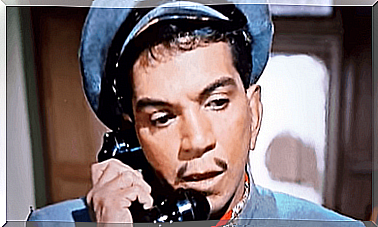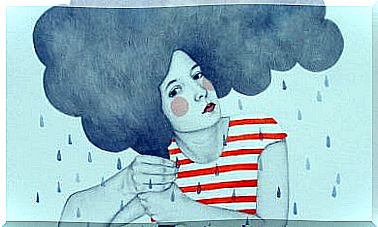The Importance Of Socialization For Brain Development

We are social beings and, as such, we know the importance of socialization to survive. Our human condition is defined by culture, and it does not develop in isolation. We can even say that interacting with other people is the best way to fully develop the brain.
Therefore, it is very important to establish friendship and companionship relationships. Not just to maintain emotional health, but also to keep the brain as active as possible. In this way, all sociable people generally favor their brain health. This feature protects your brain against cognitive decline and dementia.
Recent studies in biological anthropology demonstrate the importance of socialization for the evolutionary development of the brain. Without social relationships, we would not have updated until we are who we are. Furthermore, unfortunately, there are very illustrative cases of what happens when someone spends their first years of life isolated. Among these cases, we find those who are known as “wild children”.
The benefits of socialization for brain development and the negative effects of lacking it will be discussed in more detail below.

Socialization at the origin of the human being
The human being is the animal with the most complex brain. An organ that allows us to develop a communication system through language. In addition, it also gives us the possibility to make complicated decisions, create objects with our own hands and even dominate other species and the environment.
According to Daniel White, a specialist in brain evolution, what allowed this great brain development was socialization. For the specialist, life in society boosted our brain evolution.
Different environmental and social situations stimulated the brain to develop superior processes. This has resulted in brains with greater memory capacity, greater precision in directing hands, and language use and development (all of the evolutionary factors that have made our lives easier over the last 300,000 years).
The importance of socialization for brain development can be seen when comparing the maturation of the human brain with the case of other primates. A chimpanzee’s brain matures during gestation, and when it’s born, its brain is practically formed. By age two, chimpanzee brains have reached adult brain volume.
In the case of humans, brain maturation develops between the gestation period and goes beyond two years of life. Thus, our brain reaches the volume of an adult at 7 years of age, when the child, boy or girl, must already be prepared for the first simple social interactions.
However, although it does not get bigger in size, the human brain continues to be shaped until the age of 25, when socialization plays a very important role. In fact, it is so important that it has a decisive influence on brain maturation.
Effects of lack of socialization on the brain during childhood
Lack of socialization affects brain maturation in different ways. It is so harmful that it affects and delays brain development in general, especially in the early years of life. Thus, the absence of quality social relationships affects not only mood and behavior, but also cognitive health and motor skills.
Lack of socialization has more serious effects on the infant stage. In the first 10 years of life, human beings acquire and improve many of their higher psychological processes, such as language. Examples of these harmful effects are the cases of “wild children”.
Genie’s case shows the experience of a girl imprisoned by her parents during her first 13 years of life. She didn’t have any kind of emotional stimulation or socialization. This prevented the girl from acquiring complex language skills, she just gestured and made some sounds in response to external stimuli. Despite being 13 years old when he started his treatment, he was never able to handle any complex language fluently.
Another case is that of the wild child of L’Aveyron, which occurred in 1800. A 12-year-old boy appeared in the small village of Aveyron, France, climbing trees and running naked. Like Genie, he didn’t speak, and besides, he walked on all fours like chimpanzees. He had been abandoned or his parents died when he was very young. Therefore, he did not engage in any kind of socialization.
These two cases are just particular examples of what a lack of socialization can mean for brain development. Furthermore, they talk about the windows of development that our brain has, in which there is a predisposition to acquire certain complex skills, such as language.

Importance of socialization for the brain
We’ve already seen the importance of socialization for brain development. Socialization provides both emotional health and stimulation for the brain, proposing challenges and keeping you active. These socialization processes are vital, especially in later life, to prevent mental deterioration caused by low mental activity.
To ensure these benefits, we should try, as much as possible, to be sociable people. This socialization with other people should preferably be done orally, although it also has certain benefits to do so through writing.
People who spend much of their time in isolation can take certain steps to avoid losing the stimuli generated by social contact:
- Organize meetings with friends and family more often. Even long, periodic phone calls can have the same effect.
- Join a club or organization to do private activities and make new friends. That way you’ll keep your body and hands occupied, while activating your brain when socializing.
- It is also highly recommended to do new activities and thus meet new people from different environments than usual.
- Avoid social isolation, go out to chat and exchange ideas with known and unknown people.
- Establish friendships with people of different ages or generations. Older adults can benefit from the mental and physical quickness of younger ones. And the younger ones can learn new things from the older ones.
- Having a loving relationship stimulates our brain in many ways. If the relationship is not a cause of intense and constant suffering, it can be very beneficial.
- Seek help from professionals if the isolation situation is severe. Helplines and social centers are a good place to start. The support of a psychologist can be of great help.
In this way, the development and activation of the brain will always be assured. For the younger ones, the brain will mature thanks to socialization. For the elderly, the brain will remain active and will not deteriorate any faster thanks to socialization. After all, human beings are social beings. So why not encourage and provide socialization to benefit our brain health?









